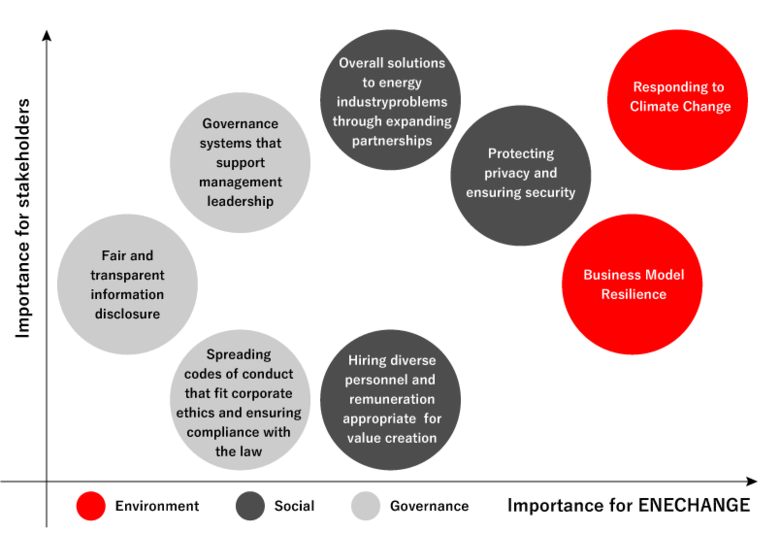SUSTAINABILITY
SUSTAINABILITY
Sustainability at ENECHANGE
As a company in the energy industry, where structural reform is essential for a sustainable society, and as a category leader in the energy tech sector, the Group actively invests in people and future energy technologies to make a positive impact on the energy industry and the decarbonised society that lies ahead. We want to be a positive influence on the energy industry and the decarbonised society that lies ahead. With this in mind, we have developed a materiality map for ESG and disclosed specific initiatives.
Creating our materiality assessment
1 Extracting material topics
Based on international indices such as SASB (Sustainability Accounting Standards Board), GRI Standards, and SDGs (United Nations Sustainable Development Goals), and through analysis of our external environment and feedback from our stakeholders, we extracted key, material issues that are highly relevant to our management to help improve our corporate value.
2 Organize material topics through dialogue with stakeholders
We gathered information on the expectations of our company through discussions with shareholders, investors, and key partners. We also gathered information on the expectations of our employees through the results of our regular employee surveys. Through these dialogues, we organized the material topics that arose.
3 Identification and positioning of material topics by management
Through discussions at meetings of the Board of Directors and the Executive Committee, we assessed the relevance of the identified material topics to our corporate strategy and identified issues to be addressed on a priority basis. As an energy tech company that promotes innovation in the energy industry, our goal is to transform the energy industry as a whole through the provision of cutting-edge technology services to energy companies that are required to change rapidly in order to realize a decarbonized society. Hence, with regards to ESG, our core business activities are in the environment (“E”) area, and we regard this as important for both our stakeholders and our company.

Material topic list, rationale, and specific initiatives
Environment
Responding to Climate Change
Why this particular issue?
Our main business is to develop innovative services using technology from a market neutral position, focusing on the 4Ds of Energy including decarbonization, and we believe responding to climate change itself will lead to business growth.
Specific Initiatives
Our Platform business for liberalization, and our Data business for digitization, decarbonization, and decentralization
Business Model Resilience
Why this particular issue?
Because it is important to become a highly sustainable corporate entity in response to the long-term vision of the energy industry, and to grow by flexibly adapting to changes in the external environment and technological innovation.
Specific initiatives
Developing a Platform business that focuses on recurring revenue with positioning in the energy vertical
Social
Overall solutions to energy industry problems through expanding partnerships
Why this particular issue?
To actively expand partnerships across multiple industry fields, both domestically and internationally, and to promote the resolution of issues in the energy industry, which will lead to a unique positioning and strong barriers for competitors to entry.
Specific initiatives
Partnership strategy for Platform business, collaboration involving investment in overseas ventures for Data business, etc.
Protecting privacy and ensuring security
Why this particular issue?
As a responsible custodian of a large amount of data, including personal information, it is essential to maintain a robust data protection system at all times in order to prevent damage to corporate value caused by information leaks.
Specific initiatives
Disclosure of information security guidelines (planned), efforts toward DX certification
Hiring diverse personnel and remuneration appropriate for value creation
Why this particular issue?
To create a comfortable working environment by actively promoting human resources with diverse backgrounds and values, and to provide appropriate compensation for value creation, which will lead to long-term organizational competitiveness.
Specific initiatives
Remote work, Employee Stock ownership system, etc.
Governance
Governance systems that support management leadership
Why this particular issue?
Because it is in the common interest of shareholders to have effective governance by knowledgeable outside directors who support appropriate risk-taking, and to construct and operate a compensation design in line with fair standards.
Specific initiatives
Skills matrix disclosure, Nomination and Compensation Committee, etc.
Spreading codes of conduct that fit corporate ethics and ensuring compliance with the law
Why this particular issue?
To become an organizational entity that maintains high ethical standards and compliance awareness and continues to learn the necessary lessons to achieve them and protect corporate value.
Specific initiatives
Formulation of Compliance Risk Management Committee, Compliance Hotline, and Values and linking them to evaluation
Fair and transparent information disclosure
Why this particular issue?
In order to ensure management transparency, we must ensure fair disclosure and provide prompt and proactive information disclosure to the capital markets based on accuracy, fairness and continuity, which will build shareholder trust.
Specific Initiatives
Disclosure in English, proactive IR activities by CFO to institutional and individual investors, detailed disclosure of KPIs and risks